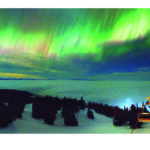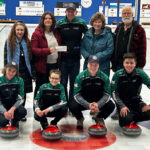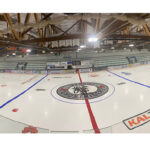Home »

Local leaders agree that more women need to run for office
The Federation of Canadian Municipalities (FCM) is on a mission to increase the number of elected female politicians.
And locally elected female leaders are glad they are.
“Currently women are not equally represented in Local Government. Women make up 52% of the population and only 24% of elected positions in local government are females. I do believe that the there should be equal representation of each gender to reflect the Canadian population in all levels of government, I think this would better reflect the views of Canadians,” said Regional District of East Kootenay Electoral Area F director Wendy Booth.
In 2005 the FCM started the Standing Committee on Increasing Women’s Participating in Municipal Government, which has laid out strategies designed to increase women’s participation in municipal politics across the country.
To that end, the FCM hosted a two-day workshop in Nelson August 27/28, offering campaign training for women in the province. The workshop is to cover a range of topics from ‘deciding to run, financing the campaign, ethics, canvassing, public speaking and media training.
Booth and Village of Canal Flats Councillor Ute Juras attended the conference on behalf of the RDEK.
“I think that we are slowly moving towards gender equality in local government. However, we still have a way to go. I think that this can be attributed to greater awareness of female politicians in the media. In addition there are networking and training opportunities that may not have been there several years ago,” Booth said.
City of Cranbrook Councillor Denise Pallesen agrees.

“I think it is important for everyone to give back to our communities, whether through volunteerism or politics. Increasing women’s participation in local government helps to maintain a good balance of thoughts and views,” she said, adding she feels there is still a way to go to reaching equality in elected positions.
“I’m not sure that our society is approaching equality in their mind set. I think women are trying to work toward equality; however, some of the issues that hold women back are the same ones that hold them back from being business owners: they are wives and mothers first, so the work/family life is always a huge challenge,” Pallesen said.
City of Fernie Councillor Mary Giuliano said equal representation makes sense in terms of numbers but more importantly, to bring a balance to governance.

“After being on council for nine years I observed that men think differently from women when it comes to politics. Some approach decisions with a purely analytical point of view, so the solution to problems concerning the people they represent becomes sometimes encumbered by too much deep thinking. To some, issues are black and white with nothing in-between,” she said.
“Women tend to look at all angles of problems with an emphasis to what is morally right as well as legally right, women can make tough decisions as much as men but they deliver the decision with a softer approach. For councils to be effective there needs to be a good proportionate ratio of men and women so that many points of view are offered for discussion of issues, Giuliano offered, adding with a wink, “Besides most women work harder.”
Village of Radium Hot Springs Mayor Dee Conklin says it can be frustrating to see a disparity between the number of women and men in elected positions, but noted that women still have the “ultimate” say with their vote.
“According to former White House press secretary Dee Dee Myers, “if women ruled the world, everything would change; politics would be more collegial. Businesses would be more productive. And communities would be healthier. Empowering women would make the world a better place,” Conklin began, adding, “Women talk more with each other, women support each other and women empathize more with people. Since entering the political arena, I have found that I have reached out to three other women in the East Kootenay for the support and back up I need to do my job well.
“There is no question that politics is still a male dominated world but they do things differently than women. They make deals, we build relationships; they posture, we cooperate; they shout, we have conversations. To be balanced in the political arena we do need to have a greater number of women around the table. I can tell you it is frustrating at times but ultimately we have our say and our vote,” she said, quickly adding, “The men in my local political world have been very supportive and not once have I not felt like an equal.”
Conklin also said she believes more women are showing interest in local politics.
“It does appear that at the local level more women are stepping forward. Like anyone in the political scene, we want to get things accomplished and one can do so at the municipal level a lot easier than at the provincial or federal level. It is also non-partisan politics which, I feel, makes it more attractive to women. You do not have to deal with the petty issues of left or right views, and you just get down and do the business of running your town,” she said.
Pallesen said she believes works remains to be done to get more women engaged in politics.
“Until women are able to overcome some self-esteem and confidence issues, it may never be equal. I’m glad the federal government sees this as an issue and is working to educate those who may be interested in running for election. The federal government needs to continue to be active in this aspect as well as making it easier, through funding to help women get in business and stay in business,” she said.
Giuliano also believes women have a long way to go before the sexes are equally represented in legislative bodies. “I think we have a long way to go,” she said, offering a detailed take. “Perhaps it’s because politics doesn’t interest women as much as men. I am thinking that a lot of women I know either don’t want the hassle of running for election, or have the time to devote to the meetings and committee work that is part of the job, especially if you are a young mother with a job, it is practically impossible to become involved in local government because of the time commitment.”
Better pay for those in office would also inspire more women to run, Giuliano offered philosophically.
“I think there has to be a way that being in local government provides a living wage for those women who then could invest the time because instead of being out in the work force they could earn money doing governance of their community, but then that would defeat the notion that one gets into local politics in order to serve their community. Would increasing remuneration change the way politicans governed? Some people think so, it might turn this mostly volunteer job that one does for love of community into a job and that would change the way the governance also worked. Personally, I got into it as an extension of the volunteer work I had been doing in the community as part of my entire life. It was never about money; it has always been about making sure I represented the people that elected me and every decision I have made has been for the good of the people and of my town. Would it change if suddenly I was making the kind of money I would make putting the time and hours I do in say in the corporate world. I would have to say that I don’t know the answer to that question. What I do know is that when there is a lot of money involved then perhaps the altruistic factor might not be as strong.”
Conklin also noted that money is not a lure for elected positions.
“It is not a fulltime job yet you are ‘on’ 24/7. Can women afford this time and financial commitment, especially if they are raising a family? Travel also becomes an issue for many women. Many ask if it is worth the sacrifice to business and to family,” she said, offering more possible reasons women don’t run for office.
“Children? Home life? Time? Confidence? Skills? Frustration? Fear? There are so many reasons,” she stated. “The first year in the position as mayor, I totally felt like a fish out of water – almost three years later, I can speak to so many issues now with confidence and knowledge,” she said, noting that life as a local politician can take a toll.
“It is so much more personal – grocery store, post office and even the coffee shop become your political forums. You give of yourself fully to be in rural local politics (and for very little compensation).
Therefore there has to be very compelling reasons to enter this world. Are there? I was told by two previous mayors (not from the Valley) when I was trying to make the decision a few years back, to “go for the ride.” I now know what they mean. I have built amazing friendships, learned more than any political science degree could ever teach, and basically, become hooked on being part of the solutions. I am talking to women in my community and area about the experiences I have had. That may be the best way to get more women involved – one conversation at a time! FCM’s work on “Increasing Women’s participation in Municipal Government” is a wonderful start. Also at the high school level is another place to engage young women. We never had a debate club back in my school days – wish we had! What a fabulous confidence builder,” Conklin said.
Booth said she thinks more women will run for office as a matter of due course.
“I think the number of females who put their name forward to run for elections will gradually increase over time as there is more exposure and knowledge about the positions. As women become more engaged in the political process you will see more females run for elected positions,” she said.
According to the FCM, the United Nations cites 30% as the minimum percentage of women needed for government to reflect women’s concerns. “Based on current statistics, Canada would need more than 1,400 more women elected to office to reach the 30% mark,” the FCM reported.
Regionally, 19 of 56 elected municipal and RDEK positions (not including the school boards of trustees) are held by women, good for 34%.
Federally and provincially, the numbers dip for women and achieving equality will take change and change is needed, Conklin asserted.
“We have come a long way but to get more women at the higher level of politics the system is going to have to change. Filibusters? What a total waste of elected official’s time! Posturing – get rid of it! Shouting across the floor – that is playground stuff! Not many women will deal in those worlds – I know I won’t. Our council meetings are civilized, organized and productive, the way all politics should be,” Conklin concluded.
Conklin’s observations of ‘the old way of doing things,’ are put another way: ‘the old boys’ club.”
However, despite a sharp difference in the number of elected men to women, the ‘old boys’ club’ seems to be waning.
“From personal experience, the ‘old boys’ club’ that I expected to encounter didn’t exist. I think having more females at the table has brought a better balance and a more respectful debate. While we don’t always agree on everything, as long as the arguments are based on fact, and presented in a professional manner, being a female at the table can be an enjoyable experience. One that I have certainly enjoyed,” Booth said of her time thus far at the RDEK board table.
Pallesen also believes her time on Cranbrook council has been an equal experience.
“I don’t feel I’ve faced difficulties in getting elected that wouldn’t be shared with everyone who ran. Constituents’ concerns are the same no matter whether you are a male or female. I do believe that it is sometimes difficult to get the average Canadian to truly believe that women can do as good a job as men,” she said.
Giuliano said she has won elections because of being known in the community and not because she is a woman, but there remains aspects of ‘the old boys’ club.
“I do sometimes feel, especially at the beginning of my first term, that some of the men on council and staff didn’t take me seriously; perhaps it was because I was so new and most of them were more experienced or perhaps it was my own perception of the situation. I think I still experience some of those thoughts today, especially with one male staff member, although I must say that my female counterparts on council have never expressed this sentiment and don’t seem to feel as I do,” she said.
“I do think though that there is still the perception with some men that they are capable of governing more than women, but personally I don’t think ability has anything to do with gender at all; it’s all to do with personality, compassion, empathy and knowledge and most of all, as one male councillor said to me years ago, “common sense” is what is needed.
“One wise woman friend said recently that it’s great if one is well educated and can speak eloquently but without wisdom in thought and expression, words are worthless. A good lesson for those of us who love to hear ourselves talk during discussions.
“And of course a deterrent is also the fact that some view being a politician of any kind as a totally thankless occupation and while that’s true that one doesn’t get accolades often – sometimes not at all – the point of seeking election is still not for receiving thanks from anyone specifically but for your own sense of pride and accomplishment in doing something good for the place you call home and that you love,” she concluded.
Municipal, regional government and school board elections are being held across the region on Saturday, Nov. 15.
The following is a list of women elected to office in the region:
District of Elkford – Coun. Mandy McGregor & Councillor Shelly McLean (two of seven elected positions)
District of Sparwood – Coun. Lois Halko; Coun. Gayle Travis; Coun. Margaret McKie and Coun. Sharon Fraser (four of seven elected positions)
City of Fernie – Mayor Cindy Corrigan; Coun. Bernie Palmer & Coun. Mary Giuliano (three of seven elected positions)
City of Cranbrook – Coun. Denise Pallesen; Coun. Diana J. Scott & Coun. Liz Schatschneider (three of seven elected positions)
City of Kimberley – Coun. Paddy Weston (one of seven elected positions)
Village of Canal Flats – Coun. Ute Juras (one of five elected positions)
District of Invermere – Coun. Spring Hawes (one of five elected positions)
Village of Radium Hot Springs – Mayor Dee Conklin & Coun. Clara Reinhardt (two of five elected positions)
Regional District of East Kootenay – Electoral Area E director Jane Walter, Electoral Area F director Wendy Booth (two of six elected positions.) And at the RDEK board table (with already-elected municipal directors included), six directors out of 15 are women.
Ian Cobb/e-KNOW







